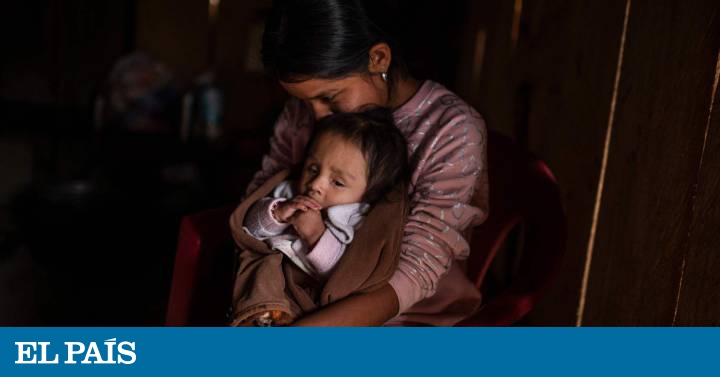1Aerial view of the community of Juvinani, a village located in the municipality of Metlatónoc, among the poorest in Mexico. In this southern community, girls are married under an ancestral purchase and sale agreement. Some families are trying to eradicate this practice, which still persists in 66 localities and is the origin of a cycle of abuse against women and poverty for men. "Most of them continue to sell their daughters," laments Eloína Feliciano, a 23-year-old indigenous Mixtec who was sold for 1,500 euros. "I don't want you to sell me," he remembers asking his mother. Despite her pleas, she was another of the girls given in marriage. PEDRO PARDO AFP
2Virginio Moreno, 72, photographed at his home in the Juvinani village, in the Metlatonoc municipality of Guerrero state, Mexico, on May 16, 2021. He assures that only 300 people agreed to leave the practice and demands attention from the authorities federal.
PEDRO PARDO AFP
3 Next to a river of grayish and smelly water, a woman anonymously expresses her rejection of tradition because she fears reprisals from her neighbors.
"The women who were forcibly sold have to tend to the father-in-law.
'I paid you and I can do whatever I want,' is what they say, ”according to this mother of two girls, distraught because her husband could repeat the story with them.
PEDRO PARDO AFP
4A woman puts veal tripe to dry in the sun in front of her home in Juvinani.
Of the almost 2,500 Mexican municipalities, about 620 are indigenous and 420 of them are governed by traditional uses and customs recognized by the Constitution.
In Metlatónoc, of 19,000 inhabitants, 94.3% lack basic services in their homes, and 58.7% have difficulties to feed themselves, according to the National Institute of Statistics (INEGI).
PEDRO PARDO AFP
5Maurilia Julio Solano, a 61-year-old midwife, kneads some tortillas at her home in Juvinani.
"They make you suffer for the simple fact of having bought you," he says in Mixtec.
She was also sold as a child and claims that she refused to do it with her daughters.
PEDRO PARDO AFP
6Cristina Moreno, 18 years old and daughter of Maurilia, also participates in the preparation of corn tortillas, the main food of the family.
They all live in a dirt-floor hut.
Indigenous people represent 10.1% of the 126 million Mexicans and almost 70% live in poverty, add other official studies.
PEDRO PARDO AFP
7Cristina Moreno, 18, with her baby at her home in Juvinani.
The house is partially built with mud bricks and pack animal manure, like most in this area.
Children prowl alongside starving dogs surrounded by flies.
PEDRO PARDO AFP
8Cristina Moreno holds her baby in her arms.
Early pregnancy is a reality here.
More than 3,000 girls and adolescents from Guerrero between the ages of 9 and 17 gave birth last year, some of them within these arranged marriages, according to official figures.
PEDRO PARDO AFP
9 “Many women say 'I am going to sell my daughter for 110, 120 thousand pesos (about four or five thousand euros) because I want money', but it makes me very sad to hear those things because they are her daughters,” she adds. Maurilia.
In the image, Yuyu Ortiz, a teenager, works in her family's restaurant, in the municipality of Metlatonoc.
PEDRO PARDO AFP
10Some children spy through a fence in Juvinani.
"We want it to change, but as people say 'I do what I want because I have my daughter and no one is going to send me' (...) we would like someone to help us, to pass a law" to prevent it, he says. Victor Moreno, 29 years old.
PEDRO PARDO AFP
11Some children, at their home in Juvinani village.
PEDRO PARDO AFP
12A boy with a donkey walks along a foggy road in the municipality of Metlatonoc.
Married under the same tradition, Moreno opposes perpetuating it as he was forced to emigrate as a day laborer to northern Mexico to pay the dowry.
Others choose the United States.
"We are poor people, we do not have to buy a daughter-in-law to marry our children and we struggle a lot to pay," adds this father of two children.
PEDRO PARDO AFP
13A man walks with a turkey through Metlatonoc Township.
The dowries charged by the brides' parents, who only accept husbands from this same region, range between 1,500 and 15,000 euros, depending on the inhabitants of the area.
PEDRO PARDO AFP
14Some children help their mother near her home in Juvinani.
Benito Mendoza, a member of the organization 'I want, I can', gave awareness workshops in Mixtec until he ran out of funds last February.
Parents "charge because they believe they should recover what was spent on women during their upbringing," he explains.
PEDRO PARDO AFP
15 "The girls are left in absolute vulnerability. Their new family enslaves them with domestic and agricultural tasks."
And sometimes "in-laws abuse them sexually," says Abel Barrera, an anthropologist and leader of the NGO Tlachinollan.
PEDRO PARDO AFP
16A girl carries firewood to use at her home in Juvinani.
Due to the "growing precariousness" of these peoples, adds Barrera, "the indigenous ancestral ritual of giving maidens for dowry since their first menstruation has been lost and now girls are being commodified."
PEDRO PARDO AFP
"I don't want you to sell me": the drama of the trade in indigenous girls in Mexico
2021-06-08T23:38:59.173Z

In a southern community in the Mexican state of Guerrero, girls are married under an ancestral purchase and sale agreement. Some families try to eradicate this practice that persists in 66 localities
